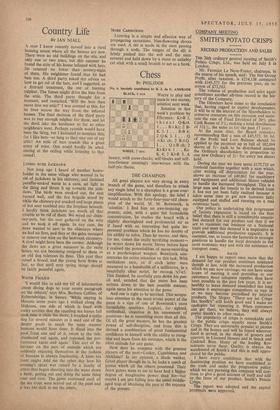Chess
By PHILIDOR No. 6, Specially contributed by B. J. du C. ANDRADE
BLACK, 6 men
WHITE to play and mate in two moves; solution next week.
Solution to last week's problem by Ellerman: Kt-B 3, threat Q-Kt4.
1 ... B xKt; 2 B- K 3. 1 . . . B-B 4;
2 Q-K 3. 1 . . Q x Kt ch; 2 R X Q.
1 . Q xB ch; 2 Kt-Kt 4. 1 . . . Kt- K 4; 2 Kt-R 5. A beauty, with cross-checks, self-blocks and self- interference cunningly interwoven with the half-pin theme.
THE CHAMPION All great players are very strong in every branch of the game, and therefore to attach any single label to a champion is a gross over- simplification. With this apology, the label I would attach to the forty-four-year-old cham- pion of the world, M. M. Botwinnik, is 'scientist.' I find him an awe-inspiring op- ponent; calm, with a quiet but formidable concentration, he studies the board with a slightly shortsighted and professorial air as if faced with an interesting but quite im- personal problem which he has no doubts of his ability to solve. Then he moves, and then, for me, comes the really terrifying moment— he writes down his move. Never before have I realised the potentialities of move-recording as a psychological weapon. Botwinnik con- centrates his entire attention on this task. With meticulous care, as if each letter were measured to a hundredth of a millimetre, in a beautifully clear script, he records 'e7-c5. This finished, he carefully puts down his pen- cil and, satisfied that the move has been written down in the best possible manner, again turns his attention to the game.
And one is right to be terrified. This scrupu- lous attention to the most trivial aspect of the game is a sign of one of Botwinnik's most formidable qualities. Logical, far - sighted, methodical, objective in his assessment of positions—he is something more than all this. Of all the great masters, he has the greatest power of self-discipline, and from this is derived a combination of great fundamental confidence in himself with the ability to recog- nise and learn from his mistakes, which is the ideal attitude for any game.
How does be compare with the greatest players of the past—Lasker, Capablanca and Alekhine? In my opinion, a shade weaker. Great player though he is, he lacks a touch of genius which all the others possessed. Their finest games seem to me to have had a higher degree of imaginative power than his—but maybe I am just falling into the usual middle- aged trap of idealising the past at the expense of the present.
WHITE, 7 men


































 Previous page
Previous page